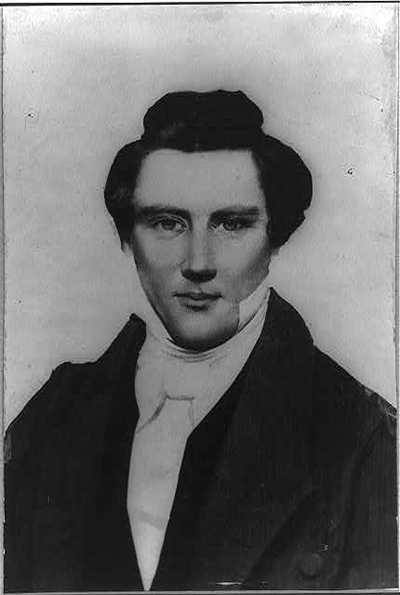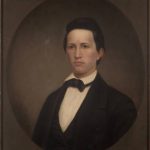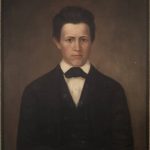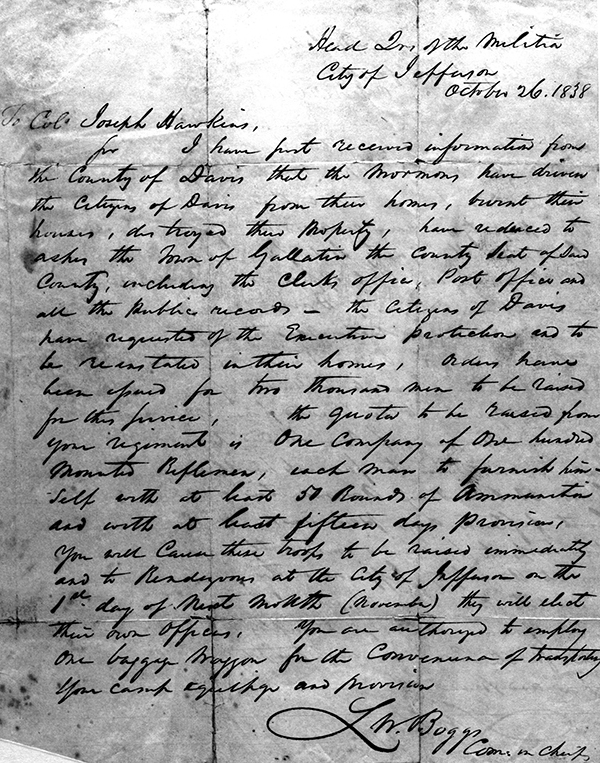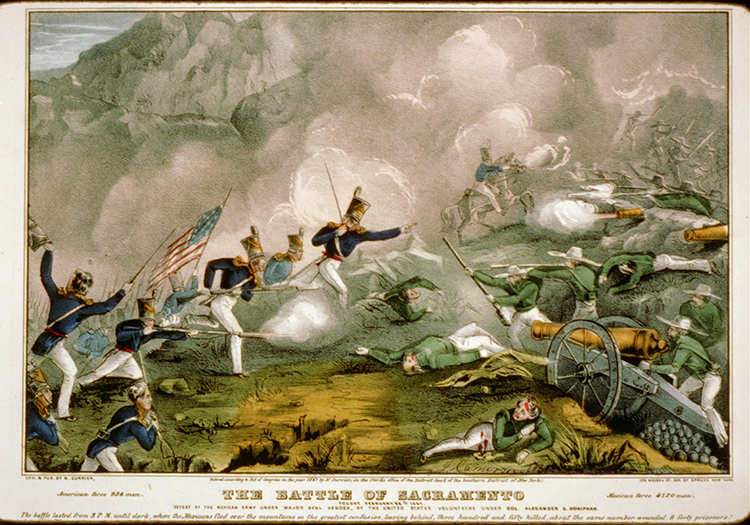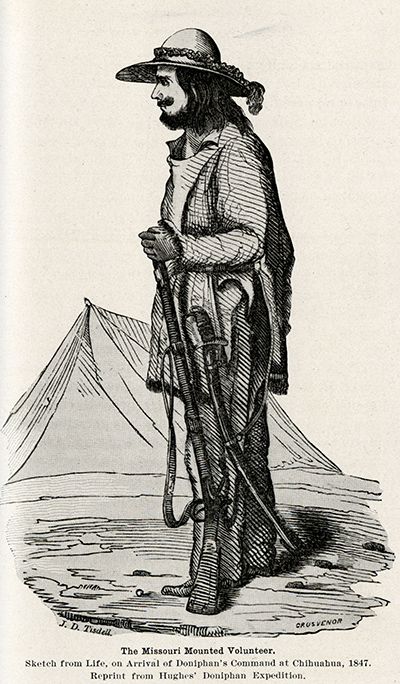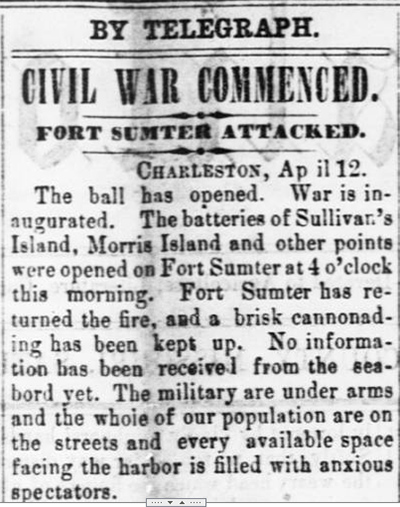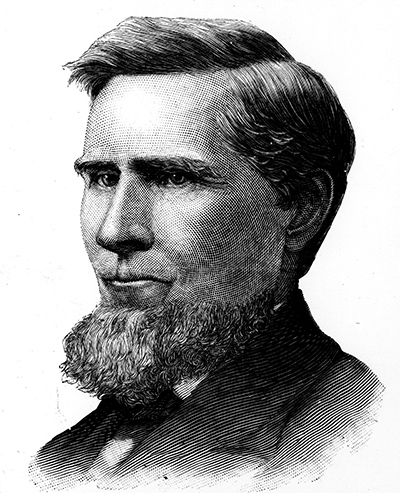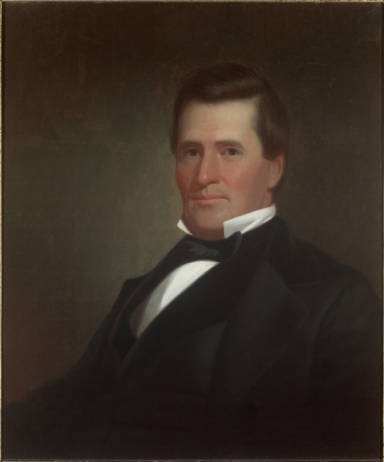
Alexander W. Doniphan

Introduction
Alexander W. Doniphan was a prominent lawyer, military leader, and political figure. He is remembered for his refusal to execute Joseph Smith and Smith’s followers during the 1838 Mormon War and his exemplary military leadership during the Mexican War of 1846–1848. Although he was not a professional military commander, Doniphan successfully led his troops on one of the longest marches in military history, contributing to the United States’ victory over Mexico.
Early Years and Education
Born on July 9, 1808, in Mason County, Kentucky, Alexander was the youngest of ten children born to Joseph and Anne Smith Doniphan. After serving in the Continental Army during the American Revolution, Joseph became a prosperous farmer and served as county sheriff.
In 1813, after Joseph Doniphan’s unexpected death, Alexander was sent to live with his oldest brother, George, in Augusta, Kentucky. Doniphan graduated from Augusta College when he was eighteen and then read law with attorney Martin P. Marshall. He was admitted to the Kentucky bar, but decided to head west in search of greater opportunity. In 1830 he settled in Lexington, Missouri, where he quickly earned a reputation as an eloquent and skilled defense attorney.
Three years later, Doniphan moved to Liberty, Missouri, and became friends with influential local attorney and politician David Rice Atchison. He also joined the local militia company, the Liberty Blues, beginning what would become a lengthy military career.
Church of Jesus Christ of Latter-Day Saints
At the same time Doniphan was establishing himself as an attorney and politician, members of the Church of Jesus Christ of Latter-Day Saints (LDS), commonly known as Mormons, were settling in Jackson County, Missouri. Many non-Mormons worried that the Mormons would soon outnumber them and gain a lock on the county’s political offices. This led to tension between the two groups and, ultimately, the expulsion of Mormons from Jackson County. Members of the church hired Doniphan, David Rice Atchison, William T. Wood, and Amos Rees to represent them in court.
Although Doniphan did not share the same religious beliefs as the Mormons, he did believe that they were entitled to the same constitutional rights as other Americans. Doniphan and his fellow attorneys, however, were unsuccessful in their legal efforts on behalf of their Mormon clients.
Politician and Family Man
In 1836 Doniphan was elected to the Missouri House of Representatives as a member of the Whig Party. He was reelected in 1840 and 1854. A sought-after bachelor, Doniphan married Elizabeth Jane Thornton on December 21, 1837, in Liberty, Missouri. The couple had two children, John Thornton Doniphan and Alexander William Doniphan, Jr. Tragically, both sons died before the age of eighteen.
The 1838 Mormon War
After trouble erupted once more between Mormons and non-Mormons, Missouri Governor Lilburn Boggs called upon the Missouri State Militia to intervene. Doniphan, a brigadier general in the militia, helped negotiate the surrender of Mormon leader Joseph Smith, Jr. and several other members of the group. General Samuel Lucas convened a military court martial and found Smith and his followers guilty of treason. Lucas then ordered Doniphan to execute the men by firing squad.
As a firm believer in the rule of law, Doniphan held that the court martial was illegal because Joseph Smith and his men were civilians and that not all members of the court martial were members of the military. He refused to carry out General Lucas’s command. Doniphan wrote Lucas, “It is cold-blooded murder. I will not obey your order. My brigade shall march for Liberty tomorrow morning, at 8 o’clock; and if you execute these men, I will hold you responsible before an earthly tribunal, so help me God.”
Lucas then placed Joseph Smith and his followers on trial at Richmond, Missouri. Doniphan once again served as the Mormon’s legal counsel. While the men were being transferred on a change of venue to Columbia, all but two of them escaped and left the state. The two remaining men were acquitted.
The Mexican War
In 1846 war broke out between the United States and Mexico. Doniphan answered the call for volunteers and enlisted as a private. He was elected colonel by the men of his regiment and placed in command of the First Missouri Mounted Volunteers, part of General Stephen Watts Kearny’s Army of the West.
In June 1846 Doniphan and his men embarked on a two-month march from Fort Leavenworth, Kansas, to Santa Fe, which was then part of Mexico, where Mexican authorities surrendered to American forces. While General Kearny pushed onward to California, Doniphan was ordered to subdue hostile Native Americans in the region, create a new government, and then march to Chihuahua, Mexico.
After completing their first two tasks, the Missourians engaged and defeated Mexican troops at the Battle of El Brazito and the Battle of the Sacramento River with few casualties. After a grueling march through rugged enemy terrain, Doniphan then joined forces with U.S. Army General Zachary Taylor at Buena Vista, Mexico. As the end of their enlistment period drew near, Doniphan and his battle-hardened troops marched to Port Isabel, boarded a steamer to New Orleans, and mustered out at St. Louis. The expedition remains one of the longest and most successful marches in military history.
Civil War
After returning home to Missouri, Doniphan continued to practice law, became a successful businessman, and helped establish William Jewell College in Liberty. He repeatedly turned down opportunities to run for Congress and the governorship, but as a prominent military and political figure in Missouri, he could not escape the coming of the Civil War.
Although an enslaver, Doniphan rejected Southern secession and favored the preservation of the Union. He served as a delegate to the failed Washington Peace Convention and was a participant at the 1861 Missouri Constitutional Convention, where he declared he was “a Union man. I go for the whole Union, the entire Union. I go for it North, South, East, and West. I do not intend to bring about a calamity that will destroy the Border Slave States and the whole Union.” Governor Claiborne Fox Jackson offered Doniphan a commission in the Missouri State Guard, but Doniphan turned it down. He spent the duration of the war as a civilian in St. Louis.
Death and Legacy
After the end of the Civil War, Doniphan and his wife moved to Richmond, Missouri. After years of poor health, Jane Doniphan died in 1873. Alexander Doniphan continued to practice law and established the Ray County Savings Bank, serving as its president.
Alexander Doniphan died on August 8, 1887, in Richmond. He is buried in Fairview Cemetery in Liberty, Missouri. A life-sized statue of Alexander Doniphan sculpted by fellow Missourian Frederick C. Hibbard is located outside of the Ray County Courthouse in Richmond, Missouri. Doniphan is remembered for his devotion to the rule of law, his belief in fairness, and his influential military and political service.
Text and research by Kimberly Harper
References and Resources
For more information about Alexander W. Doniphan’s life and career, see the following resources:
Society Resources
The following is a selected list of books, articles, and manuscripts about Alexander W. Doniphan in the research centers of The State Historical Society of Missouri. The Society’s call numbers follow the citations in brackets.
Articles from the Missouri Historical Review
- Clark, Kimball. “The Epic March of Doniphan’s Missourians.” v. 80, no. 2 (January 1986), pp.134–55.
- Culmer, Frederic A. “A Snapshot of Alexander W. Doniphan, 1808–1897.” v. 38, no. 1 (October 1943), pp. 25–32.
- McGroarty, William B., ed. “Letters from Alexander W. Doniphan.” v. 24, no. 1 (October 1929), pp. 26–39.
- McGroarty, William B. “William H. Richardson’s Journal of Doniphan’s Expedition, Part I.” v. 22, no. 2 (January 1928), pp. 193–206.
- McGroarty, William B. “William H. Richardson’s Journal of Doniphan’s Expedition, Part 2.” v. 22, no. 3(April 1928), pp. 331–60.
- McGroarty, William B. “William H. Richardson’s Journal of Doniphan’s Expedition, Part 3.” v. 22, no. 4 (July 1928), pp. 511–42.
Articles from the Newspaper Collection
- “Alexander William Doniphan: Symbol of Pioneer Americanism.” Liberty Advance, May 26, 1947, p. 5. [Reel # 26635]
- “Colonel A. W. Doniphan Appointed Commissioner to Peace Convention at Washington.” Columbia Missouri Statesman, February 8, 1861, p. 2, c. 7; p. 3, c. 1. [Reel # 7550]
- “Colonel Doniphan Refused Appointment under the New Military Bill.” Columbia Missouri Statesman, June 7, 1861, p. 2, c. 1. [Reel # 7550]
- “Colonel Doniphan Seriously Injured in Stagecoach Accident at Georgetown.” Weekly Missouri Statesman, December 29, 1854, p. 2, c. 3-4. [Reel # 7547]
Books and Articles
- Christensen, Lawrence O., William E. Foley, Gary R. Kremer, and Kenneth H. Winn, eds. Dictionary of Missouri Biography. Columbia: University of Missouri Press, 1999. pp. 246–47. [REF F508 D561]
- Dawson III, Joseph G. Doniphan’s Epic March: The 1st Missouri Volunteers in the Mexican War. Lawrence: University Press of Kansas, 1999. [REF F553.6 D325]
- Hamele, Ottamar. When Destiny Called: A Story of the Doniphan Expedition in the Mexican War. San Antonio, TX: Naylor Co., 1948. [REF F553.6 H177]
- Launius, Roger D. Alexander William Doniphan: Portrait of a Missouri Moderate. Columbia: University of Missouri Press, 1997. [REF F508.1 D717L]
- Robinson, Jacob S. A Journal of the Santa Fe Expedition under Colonel Doniphan. Princeton: Princeton University Press, 1932. [REF F553.6 R563j IN CASE]
- Williamson, Hugh P. “Colonel Alexander W. Doniphan: Soldier, Lawyer, and Statesman.” Journal of the Missouri Bar. v. 8, no. 10 (October 1952), p. 180. [REF F564 M691j v. 8]
Manuscript Collection
- Doniphan, Alexander W. (1808–1887), Letter, 1861 (C1935)
To “John,” from Washington, D.C., Feb. 22, 1861. To his nephew discussing Lincoln, state of the union, and position of border states. Also negative photostat of letter. - Doniphan, Alexander W. (1808–1887), Letter, 1878 (C1927)
To “Caroline,” from Denver, CO, Aug. 3, 1878. To his sister concerning his health. - Doniphan, Alexander W. (1808–1887), Letter, n.d. (C1803)
To J. T. F. Thompson, n.d. Gives information pertinent to the claim of Samuel Tilley. - Doniphan, Alexander W. (1808–1887), Letters, 1859 (C3520)
Letters introducing Robert G. Gilmer to Sam Houston and Asbell Smith of Galveston, TX. - Doniphan, Alexander W. (1808–1887), Letters, 1861–1873 (C1926)
Letters to John Doniphan from Liberty and Richmond, MO, concerning convention of 1861, politics, business, and legal and family affairs. - Doniphan, Alexander W. (1808–1887), Letters, 1875–1878 (C3433)
Nine letters written by Doniphan to his cousin Miss H. Emma Doniphan of Washington, D.C. He writes about his family, his health, and his education, and makes observations on politics and politicians. - Doniphan, Alexander W. (1808–1887), Letters, 1880 (C2917)
Two letters to Jennie Hockaday, Plattsburg, MO, describing the landscape and population of Denver and Manitou Springs, CO. - Richardson, William H., Diary, 1846–1847 (C0899)
This is the diary of a volunteer who served under the command of Alexander Doniphan in the Mexican War. Richardson left Carrollton, Missouri, in August 1846 and reached Monterey, Mexico, in May 1847. By July he had returned to his home in Maryland.
Outside Resources
These links, which open in another window, will take you outside the Society’s website. The Society is not responsible for the content of the following websites:
- Missouri State Archives: The Missouri Mormon War
This website features digitized documents and finding aids regarding the Missouri Mormon War in the collection of the Missouri State Archives in Jefferson City.

